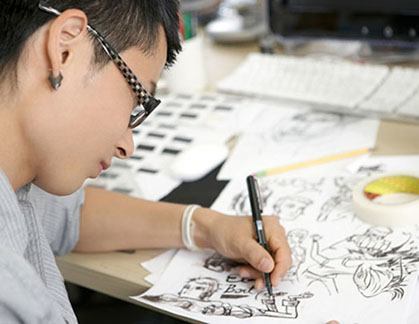Animation
School and Career Guide
Get information about animation, industry trends, available careers and the education you'll need.

Overview
Animators need more than drawing ability and technical skill to have successful animation careers. They need to be storytellers with a flair for the dramatic.
Learn About Careers and Degrees in Animation
Animation has come a long way in the last few decades. It has applications from advertising to special effects to video games. Animation is not kids' cartoons, to be enjoyed after school or on Saturday mornings while eating breakfast cereal. Whether online or on the big screen, animation school is in high demand—which makes this a great time to consider earning your degree. Use our guide to get educated on industry trends, animation software—and most of all top animation school degree programs that may help you get your foot in the door.
What Makes a Good Animator?
Not everybody can become an animator. Here are some of the basic skills and innate traits that you'll need to succeed in this challenging profession.
| YOU ARE… | YOU SHOULD HAVE… |
|---|---|
| Artistic | Good communication skills |
| Creative | Computer and graphics skills |
| Coordinated | Good decision-making ability |
| Visual | Good problem-solving skills |
| Logical | Excellent time-management skills |

Animation Degrees
Read about the types of courses you're likely to take in animation school.
Choosing an Area of Focus
Since animation is such a broad career field, you'll first need to figure out where your talent lies and which area of animation you'd like to enter and study. Typical areas of focus include the following:
- Fine arts: Here you'll learn classical applications of color theory, architecture, character movement, layout, composition and lighting, which are a solid foundation for animation careers.
- Modeling: Realistic and believable models and characters are the crux of game, CGI, effects, movie and television animation. You'll become a specialist in creating surfaces and anatomy as a 3D modeler.
- Computer animation: You'll learn 2D, 3D and 4Danimation techniques and prepare to apply them using sophisticated, state-of-the-art software such as Autodesk Maya to Cinema 4D.
- Special effects: From character traits to weather elements such as sleet and wind, you'll create photo grade effects for characters and environments in movies and games.
Once you've decided upon your area of interest, you'll dive into a curriculum that's targeted toward helping you become proficient in that area. But no matter which focus is for you, you'll also take curriculum that crosses all four major areas and is essential to all animators. Take a look at some of the common subjects you'll study below.
Common Topics Across Specialties
Whatever your school or specialization, your animation courses are likely to cover the following subject matter:
- 2D and 3D, 4D animation
- Cartooning styles
- Color and composition
- Drawing skills
- Depicting emotion
- Life drawing
- Filmmaking techniques and elements
- Storyboarding
- Storytelling
- Shading and lighting
- Rigging
- Motion capture
- History of animation
- Marketing
- Creating a portfolio or demo reel
- Software training

Online vs Campus
What are online animation education programs really like?
Is an Online Animation Program for You?
Among the options available to would-be animators are online animation programs. One of the primary benefits of attending an online program is that scheduling is often more manageable for those who need to work while attending school. You can complete the coursework anywhere there's an Internet connection, and some programs are structured asynchronously, meaning that you can view lectures and do assignments on your own time. And, a program that is properly accredited will provide curriculum that meets appropriate quality standards.
Online animation degrees are tailored to help you learn the practical application of computer animation required for a career in game design, television, movies, and interactive media.
How Online Animation Programs Work
Online animation programs differ from in-person programs in a few major ways:
- In the way that the course materials are delivered
- Online degrees may include a variety of educational technologies, from video lectures to interactive lessons
- You'll interact with your professors and fellow students using online methods, whether it's a discussion board or a real-time video or text chat
- You'll "hand in" your assignments via the Internet
What Animation Degrees are Available in an Online Format?
Since animation as a whole is moving almost completely to computers, animation degree programs are becoming more prevalent online. Some schools may offer a hybrid program, that is, a program where you can take theory, history and liberal arts requirements online but need to attend more hands-on application courses at a local college.
Some of the degrees (Certificate and Bachelor's) you can earn online include:
- Media Arts & Animation
- 2D Animation
- Computer Animation
- Game Design & Animation
- Animation Technology
Will My Courses Be the Same as in a Classroom Degree Program?
You can expect the curriculum in an online animation program to be similar in subject matter to an on-campus program. Some of your training will address the computer technology that is standard in the animation industry, such as 3d animation and rendering software. However, you'll also learn a great deal about traditional visual art, including color theory, composition and drawing, as well as filmmaking techniques.
Other coursework may include:
- Motion capture
- Compositing and scene finishing
- Shading and lighting
- Production modeling
- Character rigging

Salary
Learn what your earning potential is once you become a movie or video game animator.
How Much Does an Animator Earn?
Salary can be an important issue to consider as you're thinking about your future career as a movie or video game animator. However, it can be difficult to pinpoint your exact earning potential. There are many factors that influence animation salaries. Here are just a few things that may play a role in determining your movie animator salary:
- The kind of company you work for
- How much experience you have
- Your education level
- Where you live
- Whether you work on a contract or full-time/permanent basis
What to Expect
According to the U.S. Bureau of Labor Statistics' 2023 Occupational Employment Statistics, what you earn as an animator depends upon where you work. An interesting fact? Not all animators and special effects artists work in Hollywood. Here are highest median annual salaries for animators by top 10 metro areas:
| Metro Area | Median Annual Salary |
|---|---|
| San Jose-Sunnyvale-Santa Clara, CA | $150,810 |
| Los Angeles-Long Beach-Anaheim, CA | $131,690 |
| San Francisco-Oakland-Hayward, CA | $124,970 |
| San Antonio-New Braunfels, TX | $108,710 |
| Seattle-Tacoma-Bellevue, WA | $107,030 |
| New York-Newark-Jersey City, NY-NJ-PA | $104,830 |
| Riverside-San Bernardino-Ontario, CA | $104,020 |
| Reno, NV | $101,770 |
| Bridgeport-Stamford-Norwalk, CT | $99,500 |
| Sacramento--Roseville--Arden-Arcade, CA | $97,120 |
What to Consider
- Do you want to work in a large or small studio? Animator salaries will vary largely by the size of studio in which you're employed. For example, an animator at DreamWorks Animation earned a base average salary of $74,086, while a story artist at Mainframe Entertainment, a small (mostly television animation) studio in Canada, earned a base salary of around $68,871 (Canadian) on average annually.
- You may need to join The Animation Guild to work in a big studio such as Disney, Pixar, or Sony.
Animation Salaries by Job Type
The Animation Guild (TAG) publishes a wage survey by type of animator job. Here is 2023–2024 minimum wage info for different careers within the movie and television animation industries:
| ANIMATION JOB | MEDIAN WEEKLY SALARY |
|---|---|
| Story artists | $2,004 |
| Background painters | $1,508 |
| Modelers | $2,064 |
| 3D animators | $1,946 |
| Effects animators | $1,571 |
| Scene planner | $1,835 |
Ready to Start Your Animator Career?
The first step toward earning a movie animator salary is to get your education. Animation schools will help you learn the skill you'll need for a long and successful career as a movie animator.

About the Job
Find out what an animation career is all about.
What's an Animation Career Like?
Animated heroes and heroines need more than anvils and Acme rockets to develop their plotlines. And animators need more than drawing ability and technical skill to have successful animation careers. They need to be storytellers with a flair for the dramatic.
The use of animation is more varied than ever—from special effects to video games. Animation is not just for kids to enjoy after school or on Saturday morning. Whether online or on the big screen, animation is in high demand. So if you're thinking about starting an animation career, your timing is impeccable.
Everyday Tasks in an Animation Career
While there are many fields that have animator job openings, there are some common tasks that animators in any field do in the course of a normal day's work:
- Drawing storyboards for key scenes and creating realistic models
- Designing an animated environment that includes backgrounds, sets and objects
- Designing characters
- Photograph actors' movements and animate as 3-D characters
- Creating each frame
- Working out the timing of movements and making sure everything meets the script and soundtrack requirements
- Using computer software such as Modo, Maya, Lightwave, and Softimage
- Working as part of a team (directors, game designers, actors) to create games, movies and visual effects
- Working with clients (pitching ideas, developing concepts and timelines, monitoring deadlines)
Necessary Skills for Animators
- Artistic Ability – Whether you're creating storyboards or putting the finishing touches on a series of computer generated images, you'll need to have a good grasp on basic artistic skills.
- Storytelling Ability – You need to be a good storyteller. This includes having a good sense of timing and pacing, and knowing how to get your characters to express themselves in a believable way. As an animator, you'll be responsible for portraying characters' emotions—which means you need to understand character development.
- Technical Skill / Software Knowledge – With the increased use of computer generated imagery (CGI) technology in the film industry—in both live action films and animated movies—animation careers are becoming increasingly technical. You'll need training in various software programs that are standard in the industry. In some animation jobs you may also find math and physics helpful, as well as a general knowledge of various computer operating systems.
If you want a job that will allow you to walk the line between art and technology, with a little bit of drama thrown in, an animation career could be a great choice for you. With the growing demand for animation, there's no time like the present to find an animation school and get started today.
Categories
Animation Education & Career Guide
- Animation School and Career Guide
- Animator Profile
- How Do You Find the Best Animation School for You?
- How Technology Has Changed 3D Animation School
- How Your Choice of Animation School Can Impact Your Future
- Illustrator Career Paths: Job Duties, Education and More
- Making Your 3D Animation Demo Reel
- Outlook for Film Animation Careers
- Top 8 Cities for Animator Careers
- What You'll Learn in Computer Animation College
You may also like

Illustrator Career Paths: Job Duties, Education and More

How Do You Find the Best Animation School for You?

